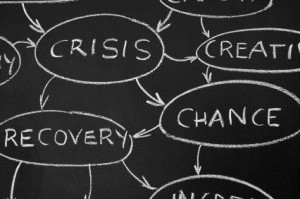If you have ever spent any time in your life in a crisis situation, you know the feelings of stress, anxiety, panic and hopelessness that come with it. Crises come in many forms and can hit anyone at any point in his or her life. I spent a few weeks in crisis recently when my daughter was diagnosed with an auto-immune disease.
I saw my daughter’s health decline rapidly. Feelings of helplessness enveloped me and waves of anxiety flooded my body, rendering me paralyzed in thought and action. At times it was surreal. During that time, I remember thinking, “So this is what crisis feels like.”
One day I admitted to my kids that I was a ‘basket case.’ When they asked what that was I realized I couldn’t define it. So we looked it up: a basket case is “a person who is useless and unable to cope.” That brought a much-needed laugh from all of us. I have succumbed to being a basket case a few times, but also found ways to cope in the midst of crisis.
Through all of this, I clung to my mindfulness breathing exercises and relaxation response to keep panic at bay. I found help and support amongst faith, family and friends. When people offered to do anything, I wrote down their name so I could remember who to call on later. Crisis has a way of re-prioritizing your life; I learned to let some of the small things go. And when the day ahead was too overwhelming to face all at once, I just focused on the very next thing I had to do… and kept doing that all day long (or as long as I could), one task at a time.
The University of Florida’s Counseling and Wellness Center offers these tips to cope with a crisis in a positive way:
1. Explore and clarify your feelings. You’re likely experiencing a myriad of feelings. It helps to identify them and know that those feelings are normal.
2. Identify and take control of your thoughts. Sometimes without our conscious awareness, our irrational thoughts spiral downward out of control. Rein your thoughts in and direct them toward helpful problem solving.
3. Get support. Communicate your thoughts and feelings about the problem to someone you trust. This will help you to feel less overwhelmed and lonely. You might also gain some perspective and clarity on what to do next.
Everyone responds differently in a crisis depending on the situation, supports and coping skills. I learned a few things I hope I remember next time crisis hits. And I hope my daughter picks up on the positive ways to cope with a crisis. As she heals from the symptoms of her disease, she is learning to cope with anxiety and pain. Our whole family is growing stronger through this experience. From now on, I won’t use the phrase ‘crisis mode’ lightly.


